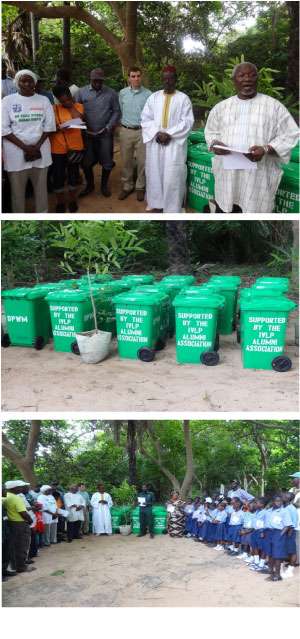
Hello and a warm welcome to another edition of Environment, your weekly column aimed at bringing environmental issues into the limelight.
A new environmental volunteerism project was launched in Abuko last Saturday. The International Visitor Leadership Programme (IVLP) Alumni Association is behind the initiative which will seek to recruit young volunteers from local schools in order to help safeguard the Abuko Nature Reserve, mitigate environment problems and support biodiversity in the national park.
The IVLP was launched by the US government in 1949 in order to help build mutual understanding with other nations through short term visits to the US of current or emerging leaders in key fields from counties around the world. The Gambia has sent a number of people to the US with the IVLP, and it is these individuals who have formed the Alumni Association now running the conservation project in Abuko.
The project will set up communal volunteer clubs and establish a seed bank and tree nurseries. Two staff from the Department of Parks and Wildlife Management (DPWM) will also be trained on volunteer management. Young volunteers will be trained on various aspects of conservation including recycling and environmentally friendly alternative cooking methods.
The launching of the project was marked by the donation of 20 bins to the DPWM, as well as the planting of two thousand-five hundred woody seedlings in the national park of Abuko.
Mr. Alpha Omar Jallow, Director of the DPWM, was present at the launch event last Saturday. He said: “The participation of all and sundry in the protection and conservation of environmental resources, especially schoolchildren and the local communities living around the protected areas, is crucial if we are to successfully protect and conserve the remaining flora and fauna for generations to come.”
According to Mr. Jallow, the protected areas in The Gambia are highly dependent on the communities dwelling around them for their protection and it is for this reason that local communities are encouraged to form parks management committees.
“The resourcing, policing and benefit sharing mechanisms introduced by this department have substantially increased volunteerism towards conserving natural resources and maintaining the environment,” said Mr. Jallow. “This project is a complimentary and will contribute towards increasing participation and instilling responsibility in school children.”
Rapid population growth in The Gambia is putting unprecedented pressure on the country’s natural resources. The need to take decisive action is a matter of urgency. More land is being converted to agricultural use, settlement and other land uses. The upland cover in most of the administrative regions of the Gambia is therefore faced with deforestations and the resultant sedimentation of the wetlands which are the country’s life support system.
Successful tree planting of the forest and other environmental good practices are crucial in preserving long lasting peace and sustainable development.
The US government has provided support to complement the Gambian government’s efforts in addressing the environmental, social and educational challenges faced by the country. It is hoped that by promoting environmental volunteering among schoolchildren, awareness of environmental issues will be raised at an early age and young people will be inspired to help protect the environment.
Such volunteerism taps into The Gambia’s long-established and traditional systems of sharing and support for the environment to bring about positive changes for the benefit of all.
John D Stubbs Jr, a political and economic officer at the US Embassy, was also present at the launch event and hailed IVLP Alumni Association for its initiative. He urged other organizations to emulate the association in its efforts to fight deforestation, land degradation, and the exploitation of the forest and natural resources.
Ms Bernice Saidy, headmistress of Abuko Lower Basic School, also expressed her delight in her school being chosen to take part in the project. She said that environmental issues are already taught at the school, but now the children will be able to experience practical aspects of environmental conservation rather than learning theory alone. She commended the officials of the alumni association and the DPWM, as well as the volunteers and urged all to embrace the project.

